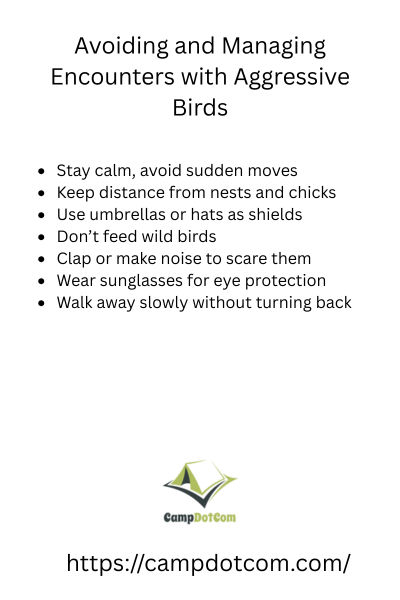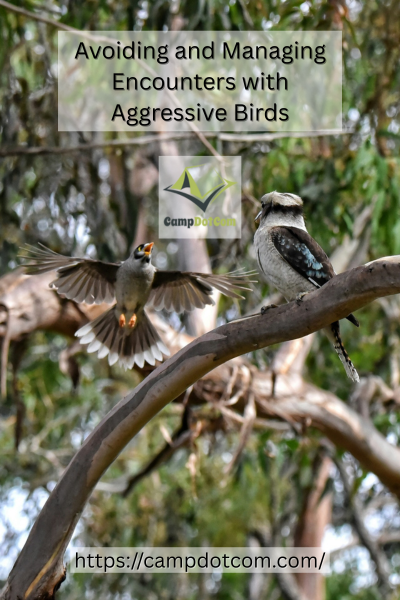Avoiding and managing encounters with aggressive birds is not something most people think about until it actually happens. One moment you are enjoying a peaceful hike or strolling through a park, and the next, a bird dives toward your head like it is starring in an action movie. It sounds funny until it happens to you.
I have been there.
A few years ago, I was walking my dog near a local trail. It was early spring with beautiful weather, trees starting to bloom, and birds singing. Then suddenly, out of nowhere, a territorial red winged blackbird swooped down at me, flapping and screeching like I owed it rent. I nearly dropped my coffee.
As an Amazon Associate, I earn from qualifying purchases. Some of the links in this article are affiliate links. This means that, at zero cost to you, I will earn an affiliate commission if you click through the link and finalize a purchase.
So let us talk about how to avoid that kind of surprise and how to handle it if a bird decides you are its number one enemy.
Read More About Avoiding and Managing Encounters with Aggressive Birds

Why Birds Get Aggressive
Understanding why aggressive birds act out is the first step in avoiding trouble. Most of the time, it’s not personal. They’re just defending their territory, especially during nesting season (typically spring to early summer). Birds like magpies, geese, seagulls, and certain hawks are known to get a little too bold when they feel threatened.
Ever walked too close to a tree and suddenly heard flapping wings behind you? That’s your cue: you’re probably near a nest.
Signs a Bird Might Attack
Before a full-on bird brawl breaks out, there are usually warning signs. If you’re trying to master avoiding and managing encounters with aggressive birds, here’s what to watch for:
– Loud screeching or warning calls
– Birds hovering, circling, or dive-bombing from above
– Puffing up feathers or charging on foot (looking at you, Canada geese)
Once you spot those signs, it’s best to back off—literally.
More Things to Know About Avoiding and Managing Encounters with Aggressive Birds

How to Avoid Aggressive Bird Encounters
So you are out on a walk, minding your own business. How do you avoid getting attacked by a bird with attitude?
Start by staying on marked trails or in open areas. If you see signs warning about nesting birds, take them seriously. Avoid walking under trees with heavy bird activity during nesting season. Wear a hat or carry an umbrella if you are in a known bird hotspot. Yes, an umbrella may sound unusual, but it works.
Another useful trick is to make eye contact. Some birds are less likely to swoop if they know you have seen them. I have stared down a goose or two in my time, and let me tell you, it can be intense.
What to Do If a Bird Attacks
If you have done everything right and the bird still comes after you, do not panic. I know that is easier said than done.
Try to remain calm and move steadily away from the area. Do not wave your arms wildly or scream, as that can make the situation worse. If a bird begins to dive at you, hold something above your head such as your backpack, your hat, or even your hand. Most birds aim for the highest point.
Above all, do not retaliate. You could make the bird more aggressive, and in some places it is against the law to disturb nesting birds.
When Aggressive Birds Become a Regular Problem
If you are often dealing with bird aggression in a specific area, consider reporting it to your local wildlife office or park authority. They may put up warning signs or even reroute trails to help people avoid nesting zones.
For homeowners, you can try using deterrents such as shiny objects, owl decoys, or reflective tape in areas where birds tend to be aggressive. Just avoid disturbing their nests unless you have spoken with a wildlife expert first.
Staying Calm and Safe Around Territorial Birds
Here is the truth. Avoiding and managing encounters with aggressive birds is not about being afraid of nature. It is about respecting it and staying safe while you enjoy the outdoors.
Birds are not out to get you. They are simply protecting their young or defending their territory. A little awareness can go a long way in avoiding trouble with protective birds.
And if you ever find yourself being dive bombed by a blackbird like I once was, remember that you are not alone. It happens to the best of us.
Stay alert, stay calm, and maybe keep that umbrella close by.
